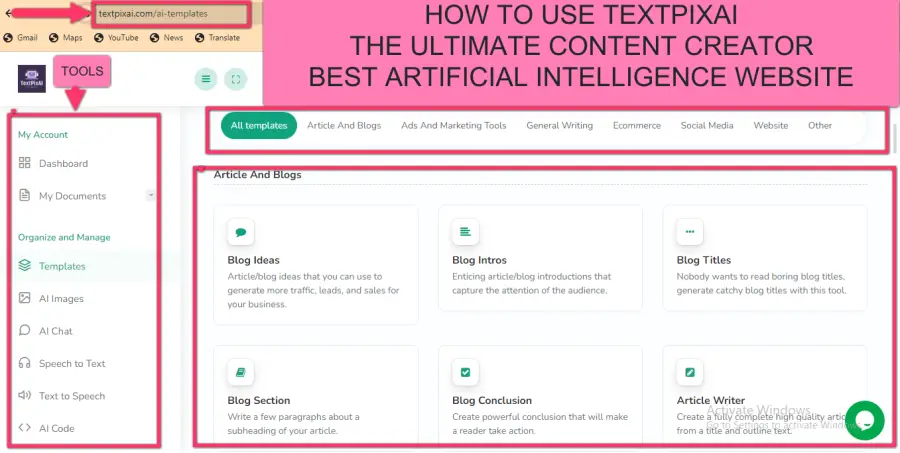AI in Marketing: A Definitive Guide
Introduction
In today's fast-paced digital landscape, staying ahead of the competition requires innovative approaches to marketing. Enter Artificial Intelligence (AI), a game-changing technology that is reshaping the marketing landscape. In this comprehensive guide, we'll explore the incredible impact of AI in marketing. From understanding the fundamentals to delving into real-world applications, strategies, and the ethical considerations of AI-driven marketing, this article is your roadmap to harnessing the full potential of AI to supercharge your marketing efforts.
You may also like to read:
AI in Business: A Comprehensive Guide
Let's embark on a journey into the world of AI in marketing, a realm where data-driven insights, automation, and personalization converge to revolutionize how businesses connect with their audience. In this guide, we will navigate through the intricacies of AI, understand its historical context in marketing, and explore how it is shaping the future of the industry.
What is AI in Marketing?
Artificial Intelligence in marketing refers to the utilization of advanced technologies such as machine learning, predictive analytics, and natural language processing to optimize and automate marketing strategies. It empowers marketers with the tools to dissect vast data sets, extract actionable insights, and engage with consumers in more meaningful and personalized ways.
AI in Marketing: A Brief History
To truly appreciate the transformative power of AI in marketing, we must first glance back at its historical evolution. AI's journey from theoretical concept to a dynamic force in contemporary marketing campaigns has been marked by significant milestones.
The Fundamentals of AI in Marketing
Before diving into the depths of AI-driven marketing, it's crucial to grasp the foundational principles that underpin this revolutionary technology. Three core components stand out: Machine Learning, Predictive Analytics, and Natural Language Processing (NLP).
Machine Learning in Marketing
At the heart of AI in marketing lies Machine Learning, a discipline that empowers marketers to analyze copious amounts of data and extract valuable insights. Machine Learning fuels personalized recommendations, customer segmentation, and predictive modeling.
Predictive Analytics for Marketing
Predictive Analytics leverages historical data to forecast future trends and consumer behavior. It empowers marketers to optimize their campaigns, identify potential leads, and enhance customer retention strategies.
Natural Language Processing (NLP) in Marketing
Natural Language Processing, a subset of AI, equips machines with the ability to understand and generate human language. In marketing, NLP plays a pivotal role in sentiment analysis, chatbots, and content creation, thereby elevating customer interactions to a new level of sophistication.
Real-world Applications of AI in Marketing
AI-driven marketing strategies have transcended theoretical concepts, finding tangible applications across diverse domains. Let's embark on a journey through the real-world applications where businesses are leveraging AI to gain a competitive edge.
1. Personalized Content Recommendations
Imagine a marketing strategy that tailors content recommendations to individual preferences. AI makes this possible by analyzing user behavior and preferences to deliver personalized content recommendations. This level of personalization enhances user engagement and drives conversions.
2. Chatbots and Virtual Assistants
In a world where instant gratification is the norm, chatbots powered by AI serve as the frontline of customer support. They are available 24/7, answering queries, providing information, and guiding users through the sales funnel. The result? Improved user experiences and increased operational efficiency.
3. Customer Segmentation
Gone are the days of generic marketing campaigns that target the masses. AI algorithms enable precise customer segmentation based on behavior, demographics, and preferences. This, in turn, empowers marketers to craft highly targeted campaigns that maximize return on investment (ROI).
4. Email Marketing Automation
AI takes the drudgery out of email marketing. By analyzing user interactions and behavior, it identifies optimal times to send personalized emails. The outcome is higher open and click-through rates, translating into more effective email marketing campaigns.
5. Predictive Lead Scoring
For sales teams, not all leads are created equal. AI swoops in to predict which leads are most likely to convert into customers. Armed with this insight, sales teams can prioritize their efforts, increase conversion rates, and optimize resource allocation.
6. Content Generation
Content is the lifeblood of marketing, but creating it consistently can be a daunting task. AI-powered tools have risen to the occasion, generating content ranging from articles to product descriptions and even social media posts. The result is a steady stream of fresh content, saving time and resources.
Strategies for Successful AI-driven Marketing
The adoption of AI in marketing necessitates a well-thought-out strategy. Let's explore the critical strategies that underpin successful AI integration.
1. Data Quality and Integration
In the realm of AI, data is king. To derive meaningful insights, it's imperative that your data is of high quality, accurate, and integrated seamlessly across platforms. AI algorithms thrive on clean, well-structured data.
2. AI Talent Acquisition
The synergy between human expertise and AI is where true magic happens. Consider hiring or upskilling employees with AI expertise. Data scientists, machine learning engineers, and AI specialists are invaluable assets in driving your AI initiatives.
3. Ethical Considerations
As AI becomes deeply entrenched in marketing, ethical considerations must not be overlooked. Maintain transparency in your AI-driven marketing practices, communicate clearly with consumers when AI is involved, and adhere to ethical guidelines to avoid perpetuating biases.
4. Continuous Learning and Adaptation
The field of AI evolves rapidly, with new breakthroughs and technologies emerging regularly. Stay informed about the latest trends, tools, and methodologies to ensure your marketing strategies remain at the cutting edge of innovation.
Ethical Considerations in AI-driven Marketing
The integration of AI in marketing brings with it a set of ethical responsibilities. Let's delve into these ethical considerations and explore best practices for AI-driven marketing.
1. Data Privacy
Respect for user privacy is paramount. Obtain explicit consent for data collection and usage, and ensure stringent security measures are in place to safeguard user data. Compliance with regulations such as GDPR is non-negotiable.
2. Transparency
Transparency builds trust. Clearly communicate to consumers when they are interacting with AI-driven systems. It's essential that users are aware of the technology behind the scenes.
3. Bias Mitigation
AI algorithms are only as unbiased as the data they are trained on. Regularly audit AI algorithms to identify and rectify biases that may exist in data or model outputs. The goal is to ensure fair and equitable treatment of all users.
Case Studies
The impact of AI in marketing becomes palpable when we examine real-world examples of companies that have seamlessly integrated AI into their marketing strategies. Let's shine a spotlight on two such success stories.
1. Netflix
Netflix, the streaming giant, has mastered the art of personalized content recommendations through AI. By analyzing user viewing history, preferences, and even the time of day they watch, Netflix's recommendation system suggests content tailored to individual tastes. The result? Enhanced customer retention and satisfaction.
2. Sephora
The beauty and cosmetics retailer, Sephora, deploys chatbots powered by AI to provide personalized product recommendations and beauty tips to customers. This interactive experience not only engages users effectively but also drives sales by helping customers discover products that align with their needs and preferences.
Conclusion
Artificial Intelligence has undoubtedly ushered in a new era of marketing. By understanding the fundamentals, exploring real-world applications, and adhering to ethical considerations, businesses can harness the full potential of AI to drive engagement, increase conversions, and deliver personalized experiences to their customers.
As AI continues to evolve, it is not a question of whether businesses should embrace it but rather how effectively they can integrate it into their marketing strategies. The future of marketing is here, and it's driven by the power of AI. It's time to embark on this transformative journey and unlock the limitless possibilities that AI offers to the world of marketing.
References
- Davenport, T. H., Harris, J., & Shapiro, J. (2010). Competing on analytics: The new science of winning. Harvard Business Press.
- Jain, A., Murty, M. N., & Flynn, P. J. (1999). Data clustering: A review. ACM computing surveys (CSUR), 31(3), 264-323.
- Marshall, G. L. (2008). A multi-stage model of word-of-mouth influence through viral marketing. International Journal of Research in Marketing, 25(3), 151-163.
This comprehensive guide on AI in marketing is designed to provide a deep understanding of how AI is transforming the field. It covers the fundamentals, real-world applications, strategies, ethical considerations, and case studies to help marketers harness the full potential of AI in their campaigns.







